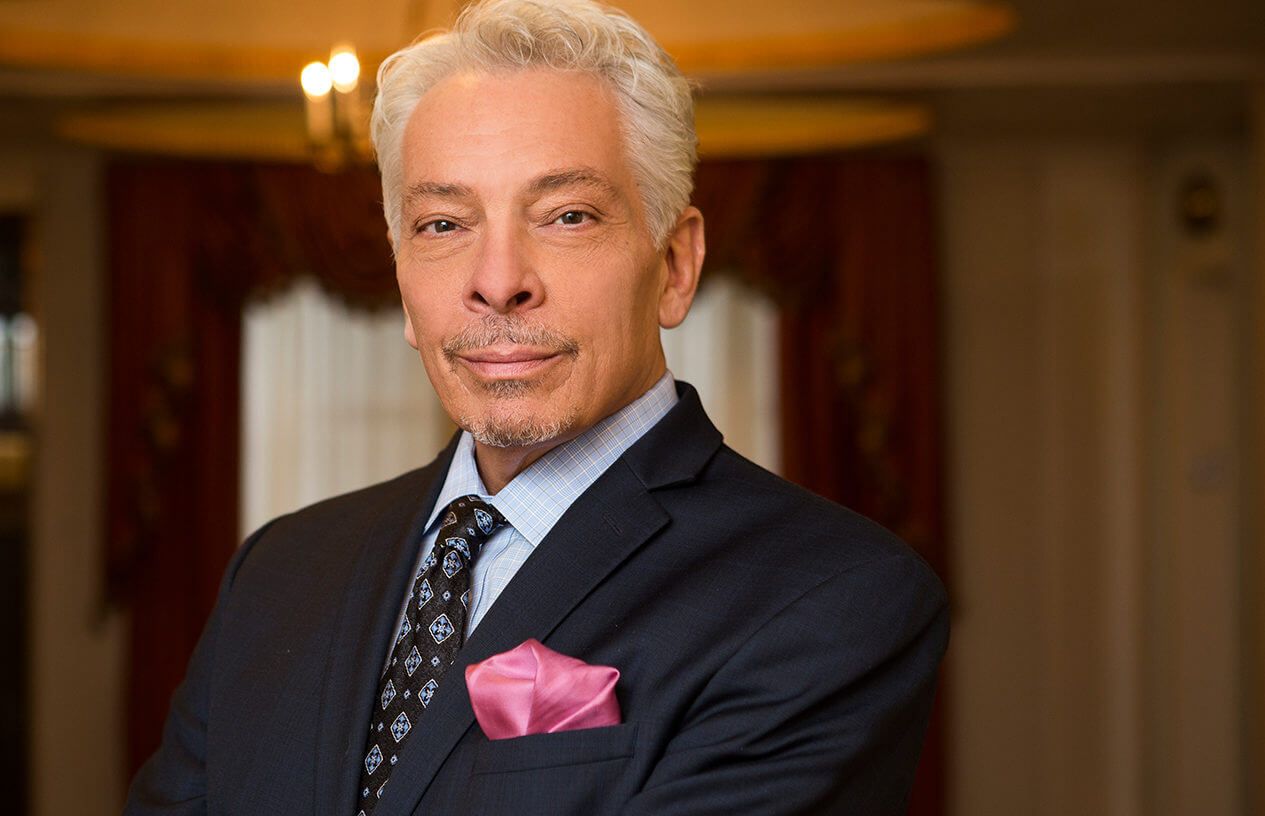“Sales is the most important part of any business. If you’re not filling the pipeline, you’re going to go out of business. ”

Mike McVay is an undeniable industry icon. During my days at Urban Network in the early 90s (another industry icon), the late Jerry Boulding constantly sang Mike’s praises. I got an incredible education during those long talks sitting in Jerry’s office, I felt like I knew many of the legends he used to talk about.
Mike has an incredibly storied industry career that has had so many successful stops, I’d have to write a book to list all that he has done in his 40-plus year career. He got his start in radio as a teenager and quickly rose up the ranks to become a PD in Los Angeles at the age of 25. The road then took many turns including many programming positions and being the GM in many markets, consulting and speaking engagements worldwide, and being a successful entrepreneur amongst other things and he STILL loves what he does.
Mike’s longevity in the industry is certainly akin to the importance of diversifying one’s career early on to create an abundance of leverage and opportunity down the road. We got a chance to catch up with him recently to talk about his career, his present position at Cumulus and his perspective on where the industry is headed.
KEVIN ROSS: How would you rate the importance of each entity when it comes to radio: Programming, Radio DJs, Music, Branding, Sales.
MIKE MCVAY: Sales is the most important part of any business. If you’re not filling the pipeline, you’re going to go out of business. Programming (which includes air-talent, music content and branding & marketing) has one purpose, that is to attract the largest audience possible that we can charge the highest rates for our advertising.
Commercial radio today is forced to integrate digital concepts into programming (social media). Do you think radio was late on this?
I don’t think that ALL of radio was slow to embrace social media, but I do think some broadcast companies were slower than others. A strong connection between the talent and the audience (or community) has always been important. Social Media is today’s best method for connecting with an audience … or perhaps I should say “potential” audience.
Blogs with celebrity gossip are a dime a dozen and only a few rank high. Some corporations feel it’s better to run duplicate celebrity gossip content on all of their sites simultaneously. Should they consider incorporating more or all local content?
Such content is sometimes “filler.” Not all of it, but many stations seem to think that they need to have a large quantity of content to create the illusion that a great service is being provided. It is wiser to have less content that has greater importance to the target audience. If I’m not going on a scavenger hunt for information, and I can find those items that mean the most to me more quickly & easily, I’m going to be a repeat user of your site.
How can local stations better utilize their websites in programming and reaching local listeners?
Drive the audience to your website to see videos that you’ve mentioned. Create “interest” among the audience.
If commercial radio is in the same class and/or the last survivor of Newspapers, Magazines, and Cable TV. What is commercial radio’s advantage over the other entities in terms of survival?
Reach … Dependency. Reach i.e. being to be everywhere and available anytime. Dependency i.e. in times when you need to know … radio is the first place people turn. We’re there for the community when a crisis takes place.
Many stations state it’s not only difficult but almost impossible to find people to manage the station website/blog who also have a knowledge of how radio works. I have found this to be true in even managing Radio Facts. It appears many radio people are not writers and many writers have little interest or knowledge about radio. Your thoughts?
I agree. Unless a station sees the financial and marketing upside, they’re not going to invest much money in the way of human resources.
When I look at Radio DJs’ pages on social media, I rarely see hashtags or links back to the station in their tweets nor do I see links to the Radio DJs social media on the station’s website in some cases. Should this be happening?
It depends on who the audience is. Are you consumer-facing or industry-facing. My social media is industry-facing and as such, I write and communicate with the audience in mind.
While many are cautious of divulging proprietary information, should programmers have a greater presence on social media? If so what should they be promoting (specifically) besides pictures with celebrities at station events?
Station events, concerts, and items of interest to the audience.
If Radio DJs are restricted in having personalities on the air and trained to get in and get out, how can they successfully manage and update their social media and become stars?
It would be disappointing to me to know that an air talent is restricted in that fashion, but if they are, they should view social media as their opportunity to show their personality. Be fun, be informative, but always be aware that you’re representing the company/station. The talent who believe that by writing that their opinion is ‘personal’ somehow enables them to say ANYTHING … is wrong. You’re always in the role of representing your station. You’re also representing and forming images of your personal brand.
V103 in Atlanta had a viral moment this past Sept where comedian Katt Williams roasted the former morning show comedian. This was a huge opportunity for the station to get national press in a market that’s deluged with the most urban competitors in the country. Should Radio DJs be trained or given permission to roll with potential viral moments or avoid them?
That’s a personal choice…in my opinion.
Do you think some Radio DJs are afraid to respond because of how they have been trained to maintain professionalism when it comes to branding for the station?
Perhaps. It requires real thought before responding. Words are like bullets. You can’t take them back. They can be deadly.
[penci_blockquote style=”style-1″ align=”center” author=”Mike McVay”]… few talents outside of morning drive are given much in the way of information about their audience, how the station is used by the audience and exactly who the audience is.[/penci_blockquote]
You started in radio in the 60s, a time when Radio DJs could make money promoting themselves and become huge stars. You were a PD in LA at 25. This is what podcasters are doing today sans the middleman and politics. They are entrepreneurs, programming and performing their own shows in their underwear in a bedroom office or perhaps in an elaborate space where they videotape their shows. Do you think podcasters will be integrated more into commercial radio since they come to the table with greater leverage?
Definitely. Yes. You nailed it as to what podcasting is today. We at Cumulus/Westwood One actually took Ben Shapiro, am amazing broadcaster and podcaster, and broadcast his podcast over the air daily. We continue to air his one hour podcast followed by two hours of live radio. There are several podcasts on the Westwood One platform that we’re considering for over the air radio programs.
As many podcasters are directly connected with fans and approached directly by corporate advertisers, what would be the appeal to get them to come to commercial radio?
Reach … again. We have huge audiences. Being a radio personality gives one a large megaphone to attract the attention of the audience. Create “fans” and bring them to your podcast. It is PUSH versus PULL. We push over the air content to the audience. They pull content from a podcast provider.
Should Radio DJs be able to sell advertising on their social media and podcasts?
Depends how small their podcast business is in regard to staff. We’re all sellers, but having an advocate on your side is the best way to move an audience and an advertiser.
How can Radio DJs be more motivated to sell the station?
Connect the dots for them. Can they make extra money selling advertising on the station? Does it keep them employed longer? These are questions they have to answer for themselves. Having the air talent be the direct seller to an advertiser does diminish their celebrity. That isn’t necessarily positive.
What do you see as the biggest problem with many local morning radio shows?
Lack of resources. Lack of guidance and direction. Poor or non-existent coaching. A lack of discipline and focus on the part of the talent.
What about afternoon shows?
Same as for mornings. Plus, few talents outside of morning drive are given much in the way of information about their audience, how the station is used by the audience and exactly who the audience is.
Why is it so difficult to find quality morning show producers?
We as an industry don’t want to pay them what they are worth. I blame us as an industry. The best producers are those that have done a morning show themselves. Too many stations want to take a part-time weekend talent and make them the producer. They’re not trained in how to do show prep. Not educated about the audience and what they’re looking for and they’re not focused on accomplishing the goals of the station & morning talent.
What makes a great programmer?
There are many ingredients in the recipe to make a great programmer. The traits that I see, which are similar person to person, are pronounced. Drive, Stamina, Focus, Honesty, Caring for Talent, the ability to motivate and excite talent, the ability to manage upwards, sideways and downwards, Understand the audience, a thirst to learn, understand the ratings, and the ability to bounce back from a loss. The intangible is having “Show Biz” in their DNA. Keep in mind that the personality of a Program Director is going to be reflected in the personality of the station.
What happens when your concepts clash with a programmer?
Cumulus has, for the most part, decentralized the corporate programming position. That means that the PD has a great deal of control over their product. We allow them to drive the car. If they’re running off the road and into the weeds, then we will put-up guardrails to keep them on the road. So … to answer the question … we seldom have clashes with winning PD’s. It is where the station is struggling that we get involved and clashes occur. The disagreements are handled as they occur and each one is different. I am not always right. Our Corporate PD’s are not always right. Neither is the local PD. We’re adults. We sit down and discuss the situation and strive to collaboratively arrive at a solution and a course for the station. Doesn’t always happen that way, but that’s what we strive for from my office. Side-note; I do admit when I am wrong. I am human. I’ve been wrong.
How long does it take you to listen to a station to identify problems?
Obvious issues are ones that I can identify immediately. A one-hour monitor of ANY station will turn-up “issues.” The question becomes “How serious are the issues?” If they’re minor … I let it go. What I do not want to do, ever, is make a PD afraid to do their job. Where we have great PD’s, we have great stations. Where we don’t have great PD’s, we often have poor radio stations. Hiring great PD’s is critical.
What are the most typical problems?
Too much input to the PD within a station. That is a Market Manager, Sales Manager, Promotion Director distracting a PD with their continual criticism of a station. Another would be the PD or the Manager getting bored. Sometimes that want to change things “because they’re bored.” I’ve sat in countless conference rooms (as a consultant and now as a corporate head of programming) and heard managers and sales reps say “We need to make the station exciting. Let’s change it up.” There needs to be a thoughtful strategy behind every change that a programmer makes. You give the audience a reason to leave whenever you make changes to their favorite station.
You mentioned something in a previous article where you said, and I’m paraphrasing ‘I leap out of bed looking forward to the day.’ I know exactly what you mean and I experienced that euphoria when I started The Industry Dot Biz in the early days. How would you describe the cause of that feeling and how others can experience it too?
In my case, it is due in large part to my upbringing. My father worked on the Pennsylvania (AMTRAK) Railroad for 45 years. He toiled. He got his hands dirty. I think about that daily. I’m blessed in that I have a job that I love. Given what I get to do in my job … it’s as if I won a contest. It’s all about mindset.
Is it possible to experience it on a continuum?
Not sure that I understand this question. Meaning “getting up for my job daily?” In that case, the continuum being far left at 0 and far right at 100, I start almost every day at 75 and it moves up and down from there based on what’s ahead for the day.
I would imagine that a man with a monumental workload such as yours relies on having a great team and efficiency. Do you believe in the 80/20 rule?
Mary Berner, CEO for Cumulus Media, has an acronym that she taught us to apply to everything. HABU … Highest and Best use. She asks us and encourages us to ask ourselves, “How is this the Highest and Best Use of my time, my peoples time, our resources (human and financial) and of the stations brand. I manage a corporate team of 14 people. Most of them apply the rules of HABU, some of them don’t. It is the latter that distracts me and I’m forced to refocus them on what’s most important to the company.
How long did it take for you to develop a formula for success?
I learned radio programming from some amazing programmers and researchers. Ed Salmon, while National PD for Storer Radio, moved me from Charleston, WVa to Los Angeles. Famous programmer and marketing wizard Jack McCoy taught me a lot. A couple of stations that I programmed used Bill Moyes and The Research Group. Consultant George Burns was a great mentor.
Lew Dickey, Sr was one of my early radio clients and I learned so much from him. Station owner, and legendary jeweler, Larry Robinson taught me management. Cleveland radio owners and entrepreneurs Tom Embrescia and Joey Restifo taught me how to be a Consultant in that they, along with Doris McVay, were my original partners in McVay Media.
Doris McVay also taught me that I’m best at the “Creative” side of the business and she is best at the “Business” side of the business. You need to know what you’re best at. Charlie Cook, a longtime network and radio programmer (and former partner in McVay Media) is today the VP/Country for Cumulus Media. Working with Charlie gave me a sounding board that has provided me with a point-counterpoint type of management style. So … the short answer is … It took me 30 years and a lot of teachers.
[penci_blockquote style=”style-1″ align=”center” author=”Mike McVay”]The internet can help a PD stay on top of trends, fashions, music, and a community’s perspective, but nothing replaces being there and meeting the “voices” of the community. I repeat … Can’t fake it.[/penci_blockquote]
From your experience, how does a company find the best team?
You have to know what you want to accomplish before you start to hire an individual to join your team and accomplish what you want. Ask anyone who knows me and they’ll tell you that I meet lots of people, and am always in interview mode, so that when we do have a “need” … we can satisfy it.
At what point did you move past that ‘everything is an emergency’ concept?
I don’t know that I really have moved past it. A therapist once told me that I have a Superman Complex in that I strive to have a fast and responsive call to action. What I’ve learned over the years is to pause, listen before reacting, and remaining focused on the goal. If the emergency has no or little impact on the goal, it isn’t an emergency. There is a quote that I once saw in a management book. “Your emergency doesn’t mean that it is my crisis.”
What do you think makes a previously successful entrepreneur like yourself appealing to a corporation and the opportunity appealing to you?
The opportunity to join Cumulus Media was because of the size of the platform. The second largest radio company, owner of a huge radio network, a growing digital platform and the opportunity to apply experiences and skills to a significant piece of the nations media platform. Many people are unaware that McVay Media had 200+ radio clients, consulted in the digital space, coached talent, consulted artists and their managers and developed syndicated radio programming.
What were your initial thoughts when offered the position with Cumulus and Westwood One?
Initially, I was flattered but wasn’t interested in giving up my business. Over a period of time, seeing the plans of the company, I became excited to join the company. It was a big decision.
The urban format is very different than other formats since African Americans drive a lot of trends when it comes to music, fashion etc. How can Radio DJs be most effective in these formats?
This format necessitates that one be connected to the community. You can’t fake it. You have to be a part of the church community. You must understand how the local leaders of the African-American community view the mayor, the police chief, the school superintendent and you should be friends with the head of the local NAACP. The internet can help a PD stay on top of trends, fashions, music and a community’s perspective, but nothing replaces being there and meeting the “voices” of the community. I repeat … Can’t fake it.
What are some of the differences between programming stations in the states vs other countries?
The level of competition in the USA is unparalleled. I get frustrated when I’m at a conference and I hear a PD from the United Kingdom state that USA Radio used to be great, but now it isn’t. Stop and think about it for a second. London has a population of 8.136 million people. That’s just under the population of New York City. There are 30 radio stations in the greater London area. There are 87 stations above the line in the Nielsen NYC rating report.
Are you still working on outside projects in conjunction with Cumulus and Westwood One?
I am not actively consulting. Cumulus Media is my primary job. McVay Media still exists. Doris McVay operates that company with the assistance of several programmers who she employs.
What do you think is the next big trend in radio?
All things are cyclical. We’re going to see more gold/classic hits formats that are focused on the 90s and early 2000’s. We’re going to see more News/Talk on FM and more Sports/Talk stations on FM.
Three pieces of the best advice you ever got?
- Most people say “… and then I’ll make my best move last.” Why not make your best move first?
- You can’t hear anything if you’re doing all the talking.
- Words are like bullets. You can’t take them back.
Three pieces of advice you can offer that you have learned on your own?
- Be humble … always.
- Keep in mind that the celebrities that you may meet and work with are, like you, doing their job. Don’t be starstruck.
- Know what your job is and do it better than anyone else.





















The Mike McVay interview was extraordinaire!!!!
Mike McVay is the biggest idiot in the business, he accelerated the Cumulus bankruptcy with his bonehead moves and bad hires. Mike McVay is the major reason the company is selling major market radio stations left and right at fire sale prices.